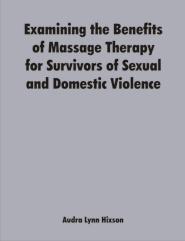LibraryLife and EnvironmentalMedical & Health Science
Examining the Benefits of Massage Therapy For Survivors of Sexual and Domestic Violence
| Institution: | Clayton College of Natural Health Birmingham |
|---|---|
| Advisor(s): | Dr. Janice Martin |
| Degree: | Ph.D. |
| Year: | 2005 |
| Volume: | 84 pages |
| ISBN-10: | 1581123159 |
| ISBN-13: | 9781581123159 |
Abstract
Women experience sexual and domestic violence at alarmingly high rates. Recovery from this type of trauma can be a complex and extensive process, that in best cases, involves a broad network for support. This dissertation examined the experiences of women over the age of 21 who have received massage therapy during their healing process from sexual or domestic violence. For the purposes of this study, the women who participated were often referred to as “survivors of abuse.” Current research examined in the literature review indicates that the effects of this type of trauma are multifaceted and that one of the interventions sought for diminishing the effects of this trauma is massage. The importance of this study, completed with the use of descriptive research methodology, included the opportunity to gain information from abuse survivors about their personal experiences with massage and how they can best be served by the massage therapist. The results of a self report survey and interview process provide valuable information to raise awareness of these societal issues among massage professionals. While the subjects were not interviewed about their specific experiences of abuse, they provided important information about the effects that these experiences have had on their lives. Further, the women interviewed shared information about the concerns that they had with regard to massage therapy and some of the specific experiences that they have had during massage sessions. Although the sample size was small, with 10 women interviewed, the information provided has clear implications for the practice of massage therapy. Some of the implications found involve therapist gender, trust building between client and practitioner, and communication with the client during massage therapy sessions. Recommendations for massage professionals have been made based on these findings. Further research opportunities exist in several areas and include screening massage clients for abuse during the intake process, examining the challenges for male massage therapists and female massage therapists, and evaluating the massage educational institutions for training in issues of trauma particular to sexual and domestic violence.

